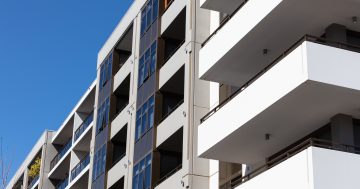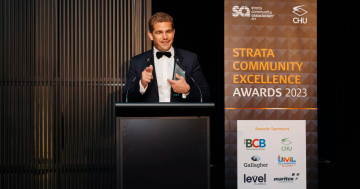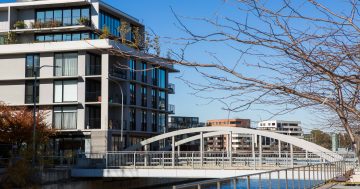
Digital concierge services are not yet big in Australia, but we now have the technologies and economies of scale to support them – and they can make life a whole lot easier. Photo: Vantage Strata.
Canberrans are embracing a new-age Australian dream with strata-titled properties making up 70 per cent of new housing in the ACT. It sets the scene for the emergence of the gold standard in services for apartment dwellers – the concierge.
Already embraced wholeheartedly in cosmopolitan cities around the world, a concierge takes care of all those “soft services” that eat into your precious free time and energy – everything from receiving parcels to arranging professional trade services.
Leading the charge in the nation’s capital is digital concierge service Taylr. Brainchild of the same team behind Vantage Strata, created to answer the demand for services outside the strata remit, Taylr acts as a conduit to the services of the outside world, delivered directly, efficiently and conveniently to your door.
“Laundry is a good example. You can certainly take your clothes, get in the car, drive it to the laundromat and wait to bring it back or you can outsource that to an intermediary,” Vantage Strata director and Taylr co-founder Chris Miller says.
Despite being fiendishly practical, it’s far from mainstream in Canberra. But Chris says there’s a simple explanation for Canberra’s slow adoption.
“There are some competing theories and the jury is still out. Some people argue that Aussies culturally are just not into it, and point out that we don’t have the same service history as more mature markets like the US. I don’t tend to agree,” he says.
“I think the answer is much simpler: Australia hasn’t had the same degree of scale and concentration in strata buildings as places like New York or Chicago.”
As more Canberrans embrace the affordability, practicality and lifestyle offered by strata-titled living, an economy of scale emerges, which changes the picture entirely to one that allows concierge services to proliferate.
“Fifteen years ago an apartment building of 100 or more in Canberra was a complete rarity. Nowadays it’s not altogether exceptional to have buildings of 300 or more units,” Chris says.
“Look at the recent completion of WOVA. With more than 800 units, it’s the largest strata complex in the ACT. The collective purchasing power of people in strata buildings like that is enormous.”

Strata complexes can leverage their collective clout to secure significant savings on products and services. Photo: Vantage Strata.
It’s still early days, and the vast majority of strata complexes in the ACT are still small with 20 or so units. However the emergence of new technology makes it possible for even these boutique-sized complexes to access services that may have previously been cost-prohibitive.
While entirely discretionary, it allows residents of strata complexes to leverage their collective clout to secure savings on products and services.
“For complexes that don’t have the economy of scale to station physical human resources, we’re now seeing a really exciting convergence of software applications and onsite physical hardware such as intelligent parcel lockers, which is creating the conditions to be able to deliver those sorts of concierge services at a much lower cost of delivery,” Chris says.
This means services for which your strata isn’t responsible – from plumbing health checks to temperature valve replacements and airconditioner servicing – can be scheduled in bulk, attracting heavy discounts on the per unit retail price.
“That can translate to significant cost savings, so all of a sudden the economics are making a lot more sense,” Chris says.
“It comes down to two things – an aggregation of demand for services and connecting that demand with the supply of those services in the most efficient way possible. It’s like the Uber of everything.”
For more information visit Taylr.





















